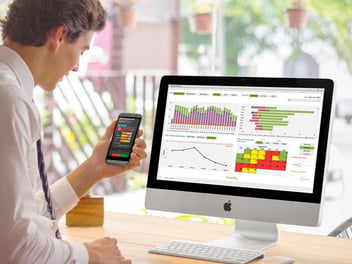How to Apply Hotel Business Intelligence to Marketing: Performance, Planning & Pace
Read More
The general consensus in business intelligence circles is that you shouldn’t wait for your business to have perfect data to undertake a BI initiative. One reason for this is because the elusive state of perfect data is never likely to arrive, despite your best efforts. Another reason is that the reporting and analytics that BI serves up actually help to expose the faults in your data, guiding you to areas that need attention. This being said, it’s still important to understand that really good, actionable hotel business intelligence depends on complete and accurate data. This is the old “garbage in, garbage out” axiom and it’s as true now as it ever was. Let’s take a look at some common areas where hotels and hotel companies frequently have room to improve their data quality.
Geographic Source Markets
Where does your hotel’s business come from? Not just anecdotally, but factually. With this information you can create more accurate forecasts, time the launch of promotions into specific marketplaces and spot emerging trends that may shape your hotel’s products or services. Yet all too often, the data that would provide this critical information is incomplete and inaccurate. Your hotel’s data is really just a residual of your hotel’s business processes. When a gap in processes leaves the guest address blank on a folio (and as that failure is repeated day after day and shift after shift) the resultant data set is “full of holes” – it’s incomplete and some large percentage of your business now has origins unknown to you. And even complete data sets can be misleading. You may have addresses for 100% of guest folios – but how comfortable are you with their accuracy? For instance, frequently a hotel’s percentage of domestic business is overstated. This is because PMS systems are often configured with the hotel’s own country as a default on folios. The result is that folios left at the default value are indistinguishable from accurate, properly updated guest records. A simple tweak to PMS configuration specifying a null value as the geographic default will help this situation considerably. We get a taste here of both the importance of solid, audited business processes and the need for careful system configuration to support these practices.
Selling Channels
This is another variant of where your hotel’s business comes from. Selling channels are of course important because these are the virtual “shelves” upon which your product is viewed and purchased. Understanding production and trends by selling channel allows you to properly allocate and position your inventory on all the right shelves. A frequently disregarded but critical element in tracking sales channel production is the configuration of the interface between the hotel’s PMS and the hotel’s central reservations system (CRS). The CRS is the lifeline of a hotel, placing its inventory on important shelves such as the GDS, the hotel’s website and OTAs such as Expedia.
The CRS provides full detail on each booking’s selling channel, down to the individual system that a GDS booking originated from (Amadeus, Galileo, Sabre, Worldspan) or on which of the OTA sites the booking was made. Yet frequently such important detail on bookings is lost (due to improper interface configuration) as the bookings flow into the hotel’s PMS. As the system of record and the most likely source of data for beginning a business intelligence initiative, it’s critical that this information is captured and retained in the PMS itself. Therefore, it’s a great investment in time to ensure that your hotel’s CRS/PMS interface is configured to best support detailed tracking by sales channel in the PMS itself.
Company Profiles
How you track the production of accounts in your hotel’s PMS can have a significant bearing on the accuracy of your account-level data. In many hotels, a choice is made to consolidate the number of “rate codes” in the PMS, assigning multiple negotiated accounts to a single rate code. The premise in these situations is to track individual account production through unique “company profiles” that must be manually attached to each booking. While there is nothing wrong in theory about this setup, in practice it is open to inaccuracies in tracking. Since a profile in this setup must be manually attached to each booking, the tracking is only as good as the weakest link in business processes. When a reservationist forgets to make that association (or associates the booking to the incorrect company profile) then your hotel’s data is compromised.
A more solid method of tracking (if a bit labor-intensive to set up initially) is to create unique rate codes in the PMS for every negotiated account. Since an account’s negotiated rate is tied to their rate code, the rate code must be placed into the reservation at the time of booking. Unlike the more tenuous connection of a profile, it can’t be forgotten. This type of setup provides you with the best chance for complete and unadulterated account-level production data.
Profiles certainly could track production accurately, and this is in fact their designed purpose. However, we should acknowledge that it is difficult (at best) to maintain a set of clean, non-duplicated profiles in a hotel environment. In fact, this is the bane of many failed hospitality CRM implementations which too often ignore this fact. With CRM we are dealing with guest (and not company) profiles, but the fact remains – any type of PMS profile-driven tracking system requires ironclad business processes to pull off successfully.
If your hotel or hotel company would like to reap the benefits that business intelligence has to offer – instant and unfettered access to transformative reporting and analytics – then an advised first step down that path is to have a realistic look at the state of your hotel’s data. While perfect data is not required, a thoughtful and diligent approach towards data and the business processes and systems configurations that shape it most certainly is. That’s an investment worth making if you have aspirations in the realm of hotel business intelligence.
%20(1).png?width=400&height=124&name=21051_HotelIQ_logo_BJ_PB_DM_GR-05%20(1)%20(1).png)




Comments